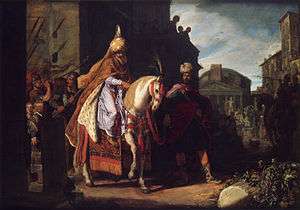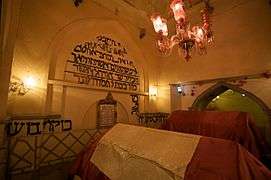Mordecai

Mordecai or Mordechai (Hebrew: מָרְדֳּכַי, Modern Mordekhay, Tiberian Mordŏḵáy, Persian: مردخای, IPA value: [moʁdoˈχaj]) is one of the main personalities in the Book of Esther in the Hebrew Bible. He was the son of Jair, of the tribe of Benjamin.
Biblical account
Mordecai resided in Susa (Shushan or Shoushan),[1] the metropolis of Persia (now Iran). He adopted his orphaned cousin (Esther 2:7), Hadassah (Esther), whom he brought up as if she were his own daughter. When "young virgins" were sought, she was taken into the presence of King Ahasuerus and was made queen in the place of the exiled queen Vashti. Mordecai was referred to subsequently as one of those who "sat in the king's gate" to indicate his position of closeness to the king. While holding this office, he discovered a plot of the king's chamberlains Bigthan and Teresh to assassinate the king. Because of Mordecai's vigilance, the plot was foiled. His services to the king in this matter were duly recorded in the king's royal diary.
Haman the Agagite had been raised to the highest position at court. In spite of the king's decree that all should prostrate themselves before Haman, Mordecai refused to do so. Though the Hebrew Scriptures attest to Israelites or Jews bowing out of respect and submission (e.g. Gen. 33: 3; 2 Sam. 24:8), Haman was a descendant of the Amalekites, their ancient enemies (Esther 3:1; 1 Sam. 15:8).[2] Haman, stung by Mordecai's refusal, resolved to accomplish his death in a wholesale murder of the Jewish exiles throughout the Persian empire. Learning of Haman's scheme, Mordecai communicated with Queen Esther regarding it, and by her bold intervention the scheme was frustrated by distributing arms to the Jews of Susa and other Persian cities where they lived and clashed with Haman's militia, until the king rescinded the edict to murder the empire's Jews. Mordecai was raised to a high rank, donned in the royal gray cloak, and Haman was executed on gallows he had by anticipation erected for Mordecai. In memory of the deliverance thus wrought for them, the Jews to this day celebrate the feast of Purim or "Lots" because of the lots that were drawn by Haman to decide whom he would first murder among the Jewish elders in Persia.
The Biblical account ends: "And all the acts of his [king Ahasuerus'] power and of his might, and the declaration of the greatness of Mordecai, whereunto the king advanced him, are they not written in the book of the chronicles of the kings of Media and Persia? For Mordecai the Jew was next unto king Ahasuerus, and great among the Jews, and accepted of the multitude of his brethren, seeking the wealth of his people, and speaking peace to all his seed." (Esther 10:2–3, KJV)
History
Name
The name "Mordecai" is of uncertain origin but is considered identical to the name Marduka or Marduku attested as the name of officials in the Persian court in thirty texts (the Persepolis Administrative Archives) from the period of Xerxes I and his father Darius, and may refer to up to four individuals, one of which might have served as the prototype for the biblical Mordecai.
The name is commonly interpreted as a theophoric name referring to the god Marduk with the understanding that it means "[servant/follower/devotee] of Marduk" in Aramaic. (The Book of Daniel contains similar accounts of Jews living in exile in Babylonia being assigned names relating to Babylonian gods.) Some suggest that as Marduk was a war-god, the expression "[servant] of Marduk" may simply denote a warrior - the popular translation of "warrior" is commonly found in naming dictionaries. Others note that Marduk was the creator in Babylonian mythology whence the term might have been understood by Jews to mean simply "[servant] of God".
The Talmud (Menachot 64b and 65a) relates that his full name was "Mordechai Bilshan" (which occurs in Ezra 2:2 and Nehemiah 7:7). Hoschander interpreted this as the Babylonian marduk-bel-shunu meaning "Marduk is their lord", "Mordecai" being thus a hypocorism.
Another interpretation of the name is that it is of Persian origin meaning "little boy". Other suggested meanings of "contrition" (Hebrew root m-r-d), "bitter" (Hebrew root m-r) or "bruising" (Hebrew root r-d-d) are listed in Hitchcock's Bible Names Dictionary of the late 19th century. There is also speculation that the name is derived from Aramaic mar dochi; mar being a title address for a gentleman and dochi, meaning "one who incurs merit" (cf. Hebrew zoche).
The Talmud provides a Midrashic interpretation of the name Mordechai Bilshan as mara dachia ("pure myrrh") alluding to Exodus 30:23 and ba'al lashon ("master of languages") reminding us that as a member of the Great Assembly he was familiar with many foreign languages.
In the King James Version of the deuterocanonical Greek additions to Esther, his name is spelled as Mardocheus.
Age
The Pentecostal minister Finis Dake interprets the Bible verses Esther 2:5–6 ("Mordecai son of Jair, the son of Shimei, the son of Kish, who had been carried into exile from Jerusalem by Nebuchadnezzar king of Babylon, among those taken captive with Jeconiah king of Judah") to mean that Mordecai himself was exiled by Nebuchadnezzar.[3]
Biblical scholar Michael D. Coogan discusses this as an inaccuracy regarding Mordecai's age.[4][5] In the passage, either Mordecai or his great-grandfather Kish is identified as having been exiled from Jerusalem to Babylon by King Nebuchadnezzar (in 597 BC). If this refers to Mordecai, he would have had to live over a century to have witnessed the events described in the Book of Esther (assuming the biblical Ahasuerus is indeed Xerxes I).[4] However, the verse may be read as referring not to Mordecai's exile to Babylon, but to his great-grandfather Kish's exile—a reading which many accept.[6][7][8][9]
Prophet status
The Talmud lists Mordecai and Esther as prophets.[10] The Talmud says Mordecai prophesied in the second year of Darius.
Mordecai's genealogy in the second chapter of the Book of Esther is given as a descendant of Kish of the Tribe of Benjamin. Kish was also the name of the father of King Saul, and the Talmud accords Mordecai the status of a descendant of the first King of Israel.[11]
The Targum Sheni gives his genealogy in more detail, as follows: "Mordecai, son of Ya'ir, son of Shim'i, son of Shmida, son of Baana, son of Eila, son of Micah, son of Mephibosheth, son of Jonathan, son of Saul, son of Kish, son of Aviel, son of Tzror, son of Bechorath, son of Aphiah, son of Sh'charim, son of Uziah, son of Sheshak, son of Michael, son of Elyael, son of Amihud, son of Shephatya, son of Psuel, son of Pison, son of Malikh, son of Jerubaal, son of Yerucham, son of Chananya, son of Zavdi, son of Elpo'al, son of Shimri, son of Zecharya, son of Merimoth, son of Hushim, son of Sh'chora, son of 'Azza, son of Gera, son of Benjamin, son of Jacob the firstborn, whose name is called Israel.")
See also
References
| Wikimedia Commons has media related to Mordecai. |
- ↑ Esther 2:5–6 of the Bible (New International Version):
- Now there was in the citadel of Susa a Jew of the tribe of Benjamin, named Mordecai son of Jair, the son of Shimei, the son of Kish, who has been carried into exile from Jerusalem by Nebuchadnezzar king of Babylon, among those taken captive with Jeconiah king of Judah.
- ↑ Carey A. Moore, Esther (New York: Doubleday, 1971), pp. 36-37
- ↑ Dake's Annotated Reference Bible
- 1 2 Coogan, Michael David Coogan, A Brief Introduction to the Old Testament: The Hebrew Bible in Its Context (New York: Oxford University Press, 2009), 396.
- ↑ Sidnie White Crawford, "Esther", in The New Interpreters Study Bible New Revised Standard Version with the Apocrypha, ed. Walter J. Harrison and Donald Senior (Nashville: Abingdon Press, 2003), 689-690.
- ↑ Another possibility is Mordechai was carried into exile as he was an infant, and The Torah timeline is only 70 years till Cyrus the Great and only about 10 more till the Purim Epic. See Legacy of Sinai by Z. Fendel, The Recent Complex Creation Framework for understanding science in full context, and Purim in the Persian Empire by Landry to understand the Torah chronology, which is in dispute with the current conventional one. New King James Version, translation of Esther 2:6
- ↑ Bromiley, Geoffrey W. (Editor), International Standard Bible Encyclopedia, Volume II, 1982, Wm. B. Eerdmans Publishing Co. p. 159 (entry: Book of Esther)
- ↑ Wiersbe,Warren W., Bible Exposition Commentary: Old Testament History, David C Cook, 2004 p. 712
- ↑ Halley's Bible Handbook
- ↑ See Megillah 15.
- ↑ Esther's Echo to the Past - Purim
External links
- Jewish Encyclopedia: Mordecai in Esther and in Rabbinical literature
